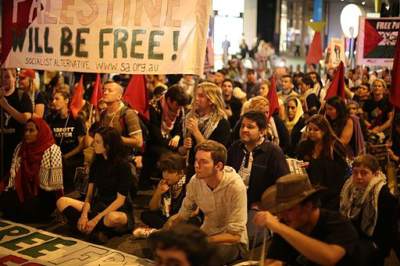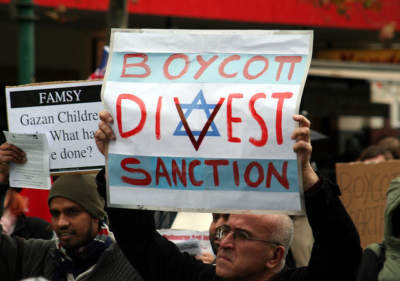“Hate Spaces,” a documentary film released in 2016 and written and directed by Avi Goldwasser, aims to shine a light on campus anti-Semitism and anti-Zionism. But, alas, “Hate Spaces” didn’t earn my love. Ultimately, while it starts out strong, it soon devolves into a conspiracy-laden diatribe about Muslims, social justice warriors, and Palestinians.
Sadly, the director has no shortage of instances to choose from where activists crossed a line from political disagreement to bigotry against Jews. Some time is spent on the embarrassing incident where students whitewashed Holocaust on Yom HaShoah, as well as the infamous UCLA incident when Rachel Beyda was not confirmed on the Student Council due to her Jewishness and concerns of “bias.”
Read More: Find “Hate Spaces” Director Avi Goldwasser’s response below.
The film also shows snapshots of students brandishing explicitly anti-Semitic protest signs at various campus marches and events, like “The lessons of the Holocaust were not learned,” alongside signs that are not anti-Semitic at all, like “Free Palestine.” Clearly, it is fair to accuse Palestine solidarity activists of failing to distinguish between Diaspora Jews and the government of Israel, contributing to the marginalization of Jews on campus and elsewhere.
On the other hand, “Hate Spaces” consistently and deliberately conflates all forms of anti-Zionism and criticism of Israel with anti-Semitism. There is no recognition of the Palestinian cause, the suffering the Occupation causes, or even Islamophobia present within Jewish communities, a source of ongoing tension between Muslims and Jews.
In fact, the film engages in some Islamophobia of its own. The inclusion of the takbir and the Muslim call to prayer spliced among pictures of shouting students bearing wince-inducing signs are a questionable decision on the part of the filmmakers, as if to suggest that Muslims are especially guilty. It’s a subtle but effective way of highlighting one minority group as responsible for anti-Semitism and ignoring other forms of leftist anti-Semitism, including extremist alphabet-soup communist and socialist groups (ISO, YDS, IYSSE, and many others) that are often just as virulent.
“Hate Spaces” also makes wild accusations connecting various student groups with Hamas and the Muslim Brotherhood, including religious clubs like Muslim Student Associations. It provides no proof, merely a graphic with arrows pointing from student groups to terrorist organizations, accompanied by chilling background music. (If you don’t know who Hassan al-Banna is, you shouldn’t be talking about the Muslim Brotherhood anyway, but the lack of understanding of its evolution and its fraught relationship with splinter groups, including Hamas, is apparent throughout.)
The film also accuses student activists of moral narcissism for engaging in social justice activities and doubles down on the point by supplying an incorrect definition of intersectionality to justify it. Instead of recognizing the interdependence and interaction between different groups and institutions, guests on the film instead insist that intersectionality is a nefarious rhetorical trick meant to collapse all issues into one. But this is a lazy claim and one that can be leveled against activists of any age or political alignment.
It is especially curious when one considers that all the talking heads in this video are older, established, and firmly right-wing Zionists. The students themselves, especially Jewish students, are merely objects in this film. There are few students given voice, and among the few, they’re rarely Jewish – merely former supporters of SJP or other groups.
This is a grave and obvious misstep. A film about Jewish experiences on campus should include Jewish student voices and Jewish students’ opinions. Their exclusion was possibly deliberate, because Jewish college students are a notoriously liberal bunch. Perhaps it was a demonstration of the narcissism of middle-aged and established right wing pundits whose views got airtime, despite their distance from life on campus.
The film’s stated purpose – to examine liberal and leftist anti-Semitism – is sorely needed. The Israel-Palestine conflict is used as something of a cipher for a myriad of other issues, including colonialism and post-colonialism, independence, identity politics, racism, and more. This often prevents genuine interaction with the issues and adds unnecessary baggage to conversations about an already complex conflict on campus. “Hate Spaces” could have been an opportunity to cut through the layers and simply acknowledge that the left has a problem.
But by engaging in Islamophobic dogwhistles, conspiracy-mongering, and student-slandering for engaging in activism at all, Goldwasser dropped the ball – and gave ammunition to those who see Jewish pushback against anti-Semitism as disingenuous and rooted in bigotry.
Berakha Guggenheim is a graduate of Hunter College CUNY and the London School of Economics. She is a contributor to various Jewish magazines.
Read a response by Avi Goldwasser, director and executive producer of “Hate Spaces” here.



